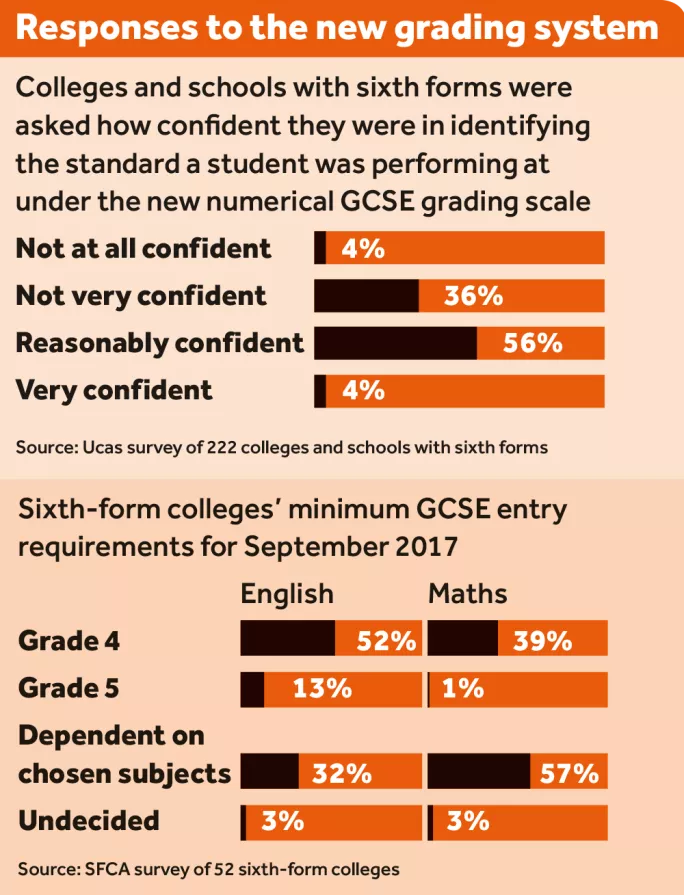GCSE ‘confusion’ creates a lottery for entry criteria

Post-16 providers are adopting a host of different entry criteria for the reformed GCSEs, new research suggests.
Because of the complexity of the new system, a number of different approaches are being taken by colleges and schools across the country, two surveys suggest.
Under the new system - with grades from 9 (the top) to 1 - the number of students achieving a grade 4 will be “anchored” to the proportion obtaining a C in the legacy qualifications.
But grade 5 will be the benchmark for a “good” pass - and, in terms of difficulty, it will be on a par with a high C or low B. For the first two years, however, colleges will not be required to offer resits to students with a grade 4 in English or maths.
A survey of colleges and schools carried out by Ucas found that there was an almost even split, with 38 per cent opting for a minimum requirement of a grade 4, and 42 per cent for a grade 5.
And, in many cases, universities have yet to finalise what GCSE grades they will require from the current cohort of students when they come to apply for undergraduate programmes in 2019, causing even greater confusion for FE providers.
Of the schools and colleges that took part in the Ucas survey, four out of 10 said they did not feel confident about identifying the standard a student was performing at under the numerical GCSE grading scale (see graphic, below).
‘A real hot topic’
Experts warned that the system was proving hugely complex for students and parents to negotiate. Catherine Sezen, senior policy manager at the Association of Colleges, said there was a “lack of clarity” around how providers should approach the new grading structure. “It’s a real hot topic in colleges at the moment,” she added. “I know of one college that had announced it was asking for a grade 5 in its prospectus but has now decided to go for a 4.
“There is a lack of clarity around grades 4 and 5, and what is a good pass. It’s confusing for all students, parents and young people.”
Separate research by the Sixth-Form Colleges Association (SFCA) has also found a range of different entry requirements being introduced by colleges across the country.
There is a lack of clarity around grades 4 and 5. It’s confusing for all students and parents
According to a poll of 52 sixth-form colleges conducted last week by the SFCA, 52 per cent of institutions have set September’s entry requirement for English at a grade 4.
In maths, however, the proportion asking for a grade 4 drops to 39 per cent. More than half (57 per cent) are planning to alter the minimum maths grade requirement depending on the subjects an applicant wants to study.
SFCA chief executive Bill Watkin said the survey results suggested that a “majority” of colleges would accept a grade 4, adding: “This reinforces earlier evidence that colleges serve a diverse, non-selective community and often make great progress with students with lower prior attainment.
“The impressive examination outcomes of sixth-form college students show just how much can be achieved through colleges’ specialist expertise in A-level teaching.”
Doing students ‘a disservice’
Jerry White, deputy principal at City College Norwich, a general FE college, said that even with two years’ grace before mandatory resits applied to students with a grade 4 in English or maths, those on longer programmes should be given the opportunity to achieve a grade 5 from their first year of study.
“We would be doing our students a complete disservice not to give them the opportunity to resit in 2017-18 while the GCSE course is still fresh in their minds after finishing school,” he added.
Uncertainty also exists over what GCSE grades universities will be expecting for entry in 2019, Mr White warned.
“If a student wants to study, say, nursing in 2020, will they need a grade 5 in English?” he said. “What we will do is have a conversation with every young person with a grade 4, to understand what their planned career trajectory is. We will advise students: ‘If you will need a grade 5 in English or maths for what you want to do, we will do all we can to help you get a grade 5’.”

You need a Tes subscription to read this article
Subscribe now to read this article and get other subscriber-only content:
- Unlimited access to all Tes magazine content
- Exclusive subscriber-only stories
- Award-winning email newsletters
Already a subscriber? Log in
You need a subscription to read this article
Subscribe now to read this article and get other subscriber-only content, including:
- Unlimited access to all Tes magazine content
- Exclusive subscriber-only stories
- Award-winning email newsletters